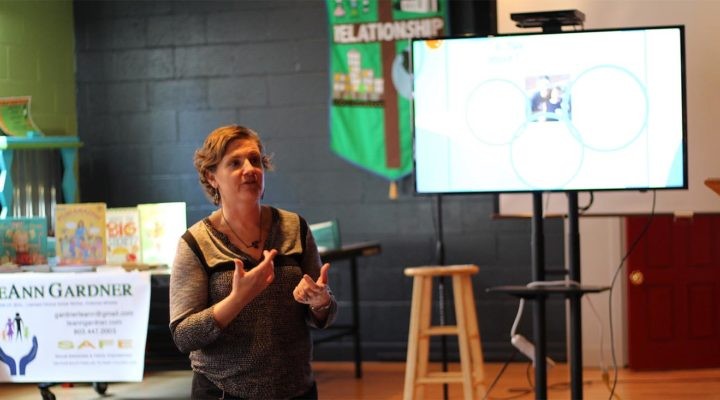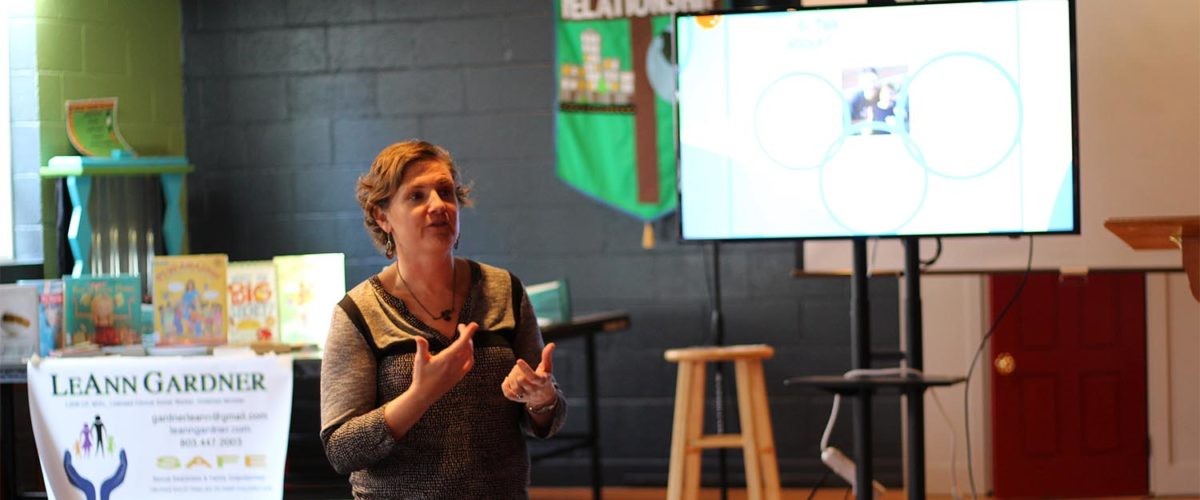LeAnn Gardner shares a lot of uncomfortable information with the churches she visits.
For example, she tells the parents of young children that those kids will almost certainly have sex before marriage — and chances are very good they will cohabitate before tying the knot.
And she always has bracing news about adolescents and Internet pornography, and about the sexual expectations for young teen, and even pre-teen, girls.

LeeAnn Gardner
Gardner delivers all of that and a lot more eye-opening insights in her eight-hour workshop called Sexual Awareness and Family Empowerment — or SAFE.
The Charleston, S.C.-based licensed clinical social worker and Baptist minister covers topics ranging from sexual development and pre-teen sexual behaviors to the role of social media and peer pressure on sexual understanding and behavior.
She also coaches parents on how and when to discuss sex and the body with their children — and how to do so from a standpoint of faith.
“People are afraid if they talk about it, their children will want to do it,” Gardner said.
“Instead, we must see our bodies and sex as gifts instead of distorting them the way society has.”
Gardner launched the program last year after being constantly approached by parents perplexed and overwhelmed by the sexually charged things their children are seeing, hearing — and repeating.
Churches contact her, too, also unsure how to address these uncomfortable topics.
“Churches tell me they have 8-year-olds who have seen pornography and their parents have no idea what to do,” she said.
Curious, nervous parents
Jennifer Davis knows that feeling.
As the minister to children and families at Broadway Baptist Church in Fort Worth, Texas, Davis said she regularly hears from groups of parents eager for knowledge and steps to take in educating their children about their bodies and sex.
“They had many questions, such as when is it the right time, have I waited too long, and how much should I tell them?” Davis said in an email to Baptist News Global.
And Davis said she was able to identify with those concerns because she is the mother of two, ages 9 and 7.
“As a parent of two boys, I always thought by now we would have had many more conversations about sex because I thought they would happen naturally,” she said.
But it hasn’t, and that’s left Davis feeling concerned about why — and what to do about it.
“I know my 9-year-old is starting to hear things from his friends at school,” she said. “I want him to be knowledgeable enough to know what they are taking about and, most importantly, for him to know he can ask us any questions about topics he might now know about.”
When Davis was tagged in a Facebook post about the SAFE workshops, she reached out and invited Gardner to Broadway, where she presented over the weekend.
Davis said she hoped to get the answers she needs, and knows she’s not alone.
“Many of the parents of my church are in the same boat I am and asking the same questions,” Davis said. They “are eager to have some guidance in navigating this with their kids.”
Winning the day
Attendees will certainly get that, but it comes with a lot of uneasy moments, Gardner said.
One of the principles she promotes is transparency, which means never avoiding a child’s questions or comments about their body or sexuality.
To help parents’ experience the discomfort they’ll feel during these conversations, she will state that the only purpose of the clitoris is pleasure.
“People will freak out that I am saying the word,” she said. “I will tell them that is the same awkwardness you will feel when you” have these discussions with children.
“Then I say, ‘you will have to do it anyway.’”
That means avoiding euphemisms for sex, reproduction or body parts, she said.
“I am focused on how we empower to create healthy human beings who can make good decisions,” Gardner said.
Her approach also emphasizes that the purpose of sex is as much for pleasure as it is procreation. The workshop also covers sexual development, including puberty and how to recognize its signs. Sexual assault and sexual abuse also are covered.
“What do you do when a 10-year-old says they have heard about rape?” Gardner said.
This is a good place to bring faith into the picture.
“You talk about sex being beautiful when it’s between adults who give consent, but that sometimes it doesn’t happen that way,” she said.
“It’s when God’s best isn’t happening and it makes us sad.”
The SAFE workshops cover the characteristics of pedophiles and the questions parents should ask before letting children spend the night at friends’ homes: will they have access to computers, are there guns in the house and who else will be present?
The web is a major topic. Even very young children who can work a computer tablet can easily be exposed to pornography, she said.
These conversations must be held throughout a person’s childhood, not in one conversation, she said. “And don’t go the quiet route. That means ‘I am not comfortable, don’t talk to me about it.’”
In homes where parents aren’t the source of this kind of information, other children and the internet will be, she added.
Studies show that sexual behavior is postponed for young people raised by parents who are approachable on these topics, Gardner said.
“That is the style that wins the day.”
— Cover photo by Annalise Gunn


